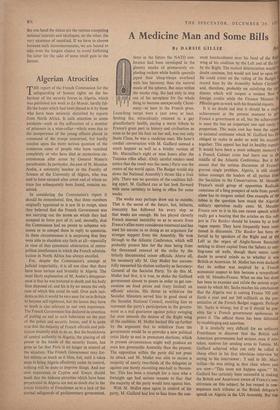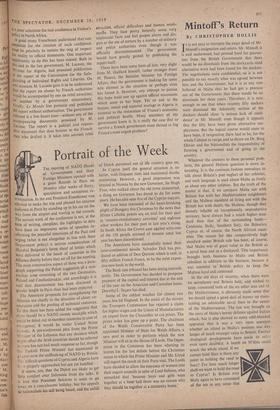A Medicine Man and Some Bills
By DARSIE GILLIE Pail SEEN in the future the NATO con- ference had been enveloped in the gloomy smoke of prematurely ex- ploding rockets while hostile sputniks piped their bleep-bleeps overhead with less harmony than the natural .music of the spheres. But once within the smoke ring, Ike had only to step out of his aeroplane for the whole thing to become unexpectedly Christ- masy—at least in the French press. Launching ramps were a year away at least. Smiling Ike, miraculously restored to a gay grandfatherly health, paying a warm tribute 'to France's great part in history and civilisation as soon as he put his foot on her soil, was not only Santa Claus, he was a medicine man. His hour's cordial conversation with M. Gaillard seemed a much happier as well as a briefer version of Mr. Macmillan's eight or nine hours after the Tunisian rifles affair. (Only careful readers need notice that the result was the same.) Paris was the centre of the world again. The Budget would slip down the National Assembly's throat like a fruit jelly. There was no question of the coalition fall- ing apart. M. Gaillard can at last look forward with some certainty to being in office for some weeks.
The weeks may perhaps draw out to months. That is the secret of the future, but, hitherto, insecurity has followed his every step so that weeks are enough. He has played cleverly French internal instability so as to secure from France's allies more considerate treatment and has used his success in so doing as an argument for stronger support from the Assembly. He won through to the Atlantic Conference, which will probably protect him for the time being from the threatened renewal of the strike by the bitterly discontented minor officials. Above all, his necessary ally M. Guy Mollet has success- fully reasserted his shaken authority as Secretary- General of the Socialist Party. To do this M. Mollet had first, it is true, to shake the Gaillard government almost to pieces in order to get con- cessions on food prices and (very limited) on officials' salaries. His threat to withdraw the Socialist Ministers served him in good stead at the Socialist National Council, enabling him to represent the party's participation in the govern- ment as a real guarantee against policy swinging far over towards the desires of the Right wing of the coalition. M. Mollet backed this up further by the argument that to withdraw from the government would be to provoke a new political crisis likely to end in premature elections, which in present circumstances might well produce an even less governable Assembly than the present. The opposition within the party did not press its attack and M. Mollet was able to secure a majority of nearly two-thirds of the delegates as against one barely exceeding one-half in Novem- ber. This has been a triumph for a man who a fortnight ago had serious reasons to fear that the majority of the party would turn against him.
With M. Mollet opce again in control of his party, M. Gaillard had less to fear from the con- stant bombardment over his head of the Rilb wing of his coalition by the Left and of the Lett by the Right. The mutual denunciation would doubt continue, but would not lead to open Waf: He could count on the voting of his Budget as record time by the Assembly before Christmas and, therefore, probably on satisfying the coo ditions which will reopen a modest flow d foreign credits while the Finance Minister M. Pflimlin gets to work with his financial repairs.
It is no doubt sad that it should be a major achievement at the present moment to 8tve France a government at all, but the achievement is none the less an important one and costly In proportion. The main cost has been the appeal to national sentiment which M. Gaillard has Mt obliged to make in order to weld his majoritY together. This appeal has had its healthy aspects. It would have been a most unhappy memory If a French Cabinet crisis had burst out in the middle of the Atlantic Conference. But it has meant that the serious discussion of France's gravest single problem, Algeria, is still almost taboo amongst the leaders of all parties from the Socialists to the Conservatives. M. Mendes' France's small group of opposition Radicals, conscious of a Fong prospect of exile from powers alone has its tongues untied. One example of the taboo is the question how much the Algerian military operation really costs. M. Mendel' France saw to it in his one recent speech whicb really got a hearing that the articles on this sub- ject in The Banker should be known by at least vague repute. They have frequently been men• tioned in discussion. The Banker has been re- ferred to by speakers of the Right and of the Left as the organ of Anglo-Saxon financiers seeking to divert capital from the Sahara to ster- ling-zone oil wells, though there seems some doubt in several minds as to whether it was British or American. M. Mollet has even declared that its author was inspired by a French economist suspect to him because a sympathiser with M. Mendes-France. What no one has done has been to examine and refute the serious argu- ments by which Mr. Sachs reaches his conclusions that the Algeria war is costing France 700 mil- liards a year and not 360 milliards as the pre- sentation of the French Budget suggests. Perhaps Mr. Sachs is wrong; but if so it should be pos- sible for a French government spokesman to prove it. The official thesis has been defended by mudslinging and assertion.
It is similarly very difficult for an ordinary Frenchman to discover that the British and American governments had serious, even if mis- taken, motives for sending arms to Tunisia. M. Gaillard achieved what can only be called a cheap effect in his first television interview by saying to the interviewer : 'I said to Mr. Mac- millan—he was sitting in that chair where you are now—"This must not happen again."' M. Gaillard has certainly been successful in making the British and Americans aware of France's sen- sitiveness on this subject; he has reaped in con- sequence such tributes as the British delegate's speech on Algeria in the UN Assembly. But this Part
Right le Left uld no n wat is a poor substitute for real confidence in France's Policy in North Africa.
A good many Frenchmen understand that 'one Condition for the creation of such• confidence must be precisely to restore the ring of respect for reality to official statements. One important °Pnortunity to do this has been missed. Both in this and in the last government, M. Lacoste, the Minister for Algeria, had promised. publication (if the report of the Commission for the Safe- guarding of Individual Rights and Liberties. On '3:12 occasion M. Lacoste gave it to be understood that the report on abuses by French authorities \vould be accompanied by one on rebel atrocities; O another by a government commentary. Finally, Le Monde lost patience and published the report without authorisation. The government released it a few hours later—without any of the accompanying documents promised by M. Lacoste. The report is a judicial and reason- able document that does honour to the French- Hien who drafted it. It takes into account rebel
atrocities, official difficulties and human weak- nessts. They face pretty honestly some very unpleasant facts and feel proper alarm and dis- gust at the use of torture by a number of military and police authorities even though it was officially discountenanced. The government would have greatly gained by publishing the report itself.
There have been some hints of late, very slight from M. Gaillard himself, rather stronger from' M. Pineau, the Socialist Minister for Foreign Affairs, that the government is looking for some new element in the situation or perhaps even has found it. However, any attempt to pursue this hope leads one up against official statements which seem to bar hope. Yet an end to the human, moral and material wastage in Algeria is essential to the restoration of France's economic and political health. Many members of the government know it. Is it really the case that to survive a French goverhment must shroud in fog France's most urgent problem?



































 Previous page
Previous page